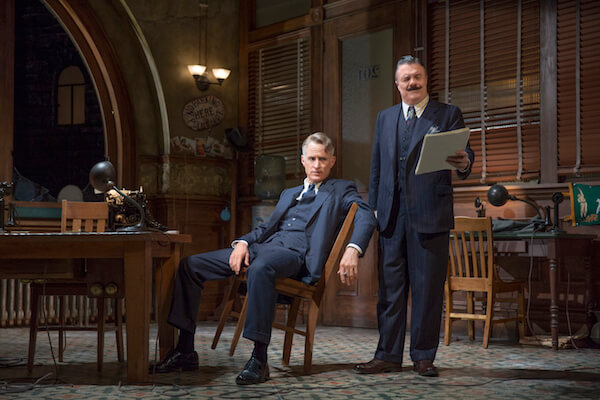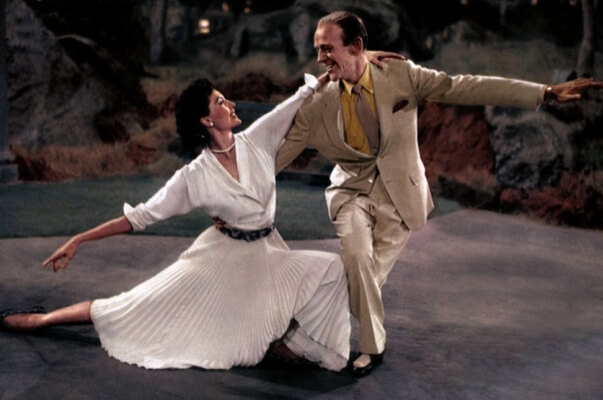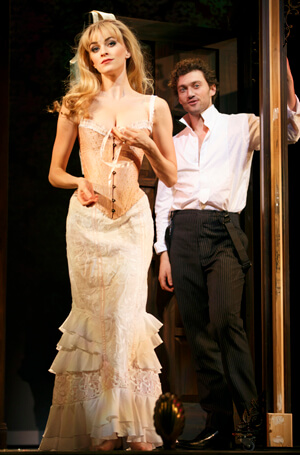Elisabeth Moss and Jason Biggs in Wendy Wasserstein’s “The Heidi Chronicles,” directed by Pam MacKinnon. | JOAN MARCUS
When it premiered on Broadway in 1989 (after a successful stint Off Broadway beginning the year before), “The Heidi Chronicles” was more than just an awards juggernaut, snapping up Best Play Tony and Drama Desk Awards and the Pulitzer Prize, among many others.
The sharply observed comic drama, tracing one woman’s rocky path to self-discovery in a male-dominated society across three decades, was nothing short of a cultural phenomenon. At a period where many considered Women’s Lib as passé as tie-dyed T-shirts — it was the era of Reaganomics and “Greed is Good” — the play reminded us that, despite women sporting shoulder pads and power suits, total gender equality was still a ways off.
The stalwart but fragile Heidi Holland was a pioneering art historian and essayist schooled at Vassar and Yale, specializing in masterful, marginalized women artists. The play had an extra degree of resonance being written by Wendy Wasserstein, at a time when women playwrights were particularly scarce on the Great White Way.
First-rate revival of Wasserstein drama about friendships and feminism
And now, more than a quarter-century later, “The Heidi Chronicles” is back, in its first Broadway revival. Which begs the question: How has the play aged?
Astonishingly well, I must say. Turn on any morning show these days and you’ll find the topics of gender equality and work-family balance as vital as ever. Just last month, Patricia Arquette created a splash with her badass Oscar acceptance speech, demanding equal pay and rights for women.
An argument could be made that the depictions of the ‘60s, ‘70s, and ‘80s are now further in our collective rearview mirror and carry a more provocative weight of nostalgia than when the drama first premiered. Another key theme, concerning good friends trying to sustain friendships over long periods while juggling careers and families, is also just as potent today.
It doesn’t hurt that this “Heidi Chronicles,” astutely directed by Pam MacKinnon (one of a growing number of women Broadway directors, I might add), is receiving a savvy, slick production at the intimate Music Box Theatre. The impressive set, by John Lee Beatty, morphs seamlessly from sleek lecture hall, to a church basement hosting a women’s consciousness-raising group, to a wedding celebration at the Pierre Hotel, to a pediatric ward at Bellevue Hospital. Scene changes come alive with period pop music (by Jill BC DuBoff) and projected montages (by Peter Nigrini) of iconic newsmakers like Jimmy Carter, Geraldine Ferraro, and Ronald Regan.
The cast is well up to the task. In the title role, an incandescent Elisabeth Moss has effectively shucked off her “Mad Men” Peggy persona, yet embodies Heidi with just as many swirling undercurrents. And that’s not to say the characters don’t share the same DNA — both are conflicted women making their way in male-driven fields (advertising and art).
Heidi is prone to self-doubt and feels guilty for letting boyfriend Scoop call the shots, betraying her feminist leanings. “I allow him to make me feel valuable,” she admits to her “sisters” at the women’s rap session.
Returning as a guest speaker at her high school, Heidi has a breakdown while giving a talk on her supposed successful career. As delivered with increasing intensity by Moss, the lump-in-the-throat scene is the most forceful in the play.
Bryce Pinkham brings a manic, off-kilter charm, honed during his acclaimed lead turn in “A Gentleman’s Guide to Love and Murder,” to Heidi’s soulmate, Peter, a renowned pediatrician. Halfway through the play he discloses he’s gay, slamming the door on any romantic fantasies Heidi had of him. As portrayed by Pinkham, the brainy, mischievous Peter explodes the typical gay sidekick trope, and his monologue about losing friends to AIDS is devastatingly poignant.
Heidi’s other BFF, who tries on a variety of personas over the years, including as an aide in a Montana women’s collective and as a television producer in New York City, is played with fervor by the versatile Ali Ahn.
“I’m sorry Honey but you’re too deep for me,” she says to Heidi. “By now I’ve been so many people, I don’t know who I am. And I don’t care.”
Jason Biggs, best known for the “American Pie” film franchise, turns in a solid performance as Scoop, Heidi’s one-time journalist boyfriend who started the Liberated Earth News in the late 1960s and, appropriately enough, publishes a materialistic, trendy magazine in the 1980s called Boomer. He does lunches at Le Cirque.
The myriad supporting roles are ably handled by Tracee Chimo, Andy Truschinski, Leighton Bryan, and Elise Kibler.
“Our friends are our families,” Peter says of the distinct bonds forged among gays whose biological families may have shunned them. I first heard that incredibly astute, oddly comforting sentiment over 25 years ago when “Heidi Chronicles” first premiered. As delivered in this intelligent, vibrant revival, it rings just as ardently today.
THE HEIDI CHRONICLES | Music Box Theatre, 239 W. 45th St. | Through Aug. 9: Tue.-Thu. at 7:30 p.m.; Fri.-Sat. at 8 p.m.; Sat., Wed. at 2 p.m.; Sun. at 3 p.m. | $59-$139 at telecharge.com or 212-239-6200 | Two hrs., 35 mins., with intermission



































